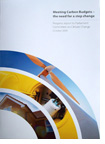 The UK’s Committee on Climate Change, established to advise the British government on emissions targets and to report to Parliament on the progress being made towards achieving those targets, has just published its first annual report: Meeting Carbon Budgets – the need for a step change. It warns that the current rate of emissions reductions, running at about 1% per year, needs to be increased to 2% and perhaps 3% if the UK is to hit its relatively ambitious 34% emissions cut by 2020. Here’s how the Guardian reports it:
The UK’s Committee on Climate Change, established to advise the British government on emissions targets and to report to Parliament on the progress being made towards achieving those targets, has just published its first annual report: Meeting Carbon Budgets – the need for a step change. It warns that the current rate of emissions reductions, running at about 1% per year, needs to be increased to 2% and perhaps 3% if the UK is to hit its relatively ambitious 34% emissions cut by 2020. Here’s how the Guardian reports it:
A green and pleasant land, with millions of electric cars powered from wind turbines and travelling between super-cosy homes and offices: that is the vision for Britain in 2020 set out today by the government’s climate watchdog.
That cleaner, greener country, playing its full part in averting disastrous global warming, is both possible and affordable, says the Climate Change Committee – but only if the government acts immediately to implement radical policies on energy efficiency and low carbon technologies, as well as dealing with the threat of the recession to carbon trading schemes.
The Times is more concerned with the suggestion that motoring taxes could be increased, but Richard Black at the BBC provides a good overview.
The report is well worth a read, not because the policy suggestions are directly relevant to NZ’s position (though encouraging household energy efficiency, electric vehicles and boosting renewables should be part of what we do), but because the Committee itself is a policy body that New Zealand sorely needs. Instead of arguing in parliamentary committee rooms about the existence of warming, this body takes the best scientific advice and applies it to determine credible policy objectives. That’s one reason why Britain’s current targets are amongst the most aggressive in the developed world. But the committee does much more: it reports on the progress being made, and establishes a “reporting to budget” process that would be familiar to anyone who has managed anything other than the smallest of businesses. And as this first report shows, if it looks like the budget forecasts are going to be missed, they are not afraid to recommend policy initiatives.
To me, that looks like a rational way to approach the issue. What a pity that instead NZ has leaders who are unwilling to lead, no effective mechanism for emissions reductions, and a government in thrall to big emitters. Climate policy needs to be made on the basis of rational analysis, not National’s paralysis.
[Taj Mahal]
Like this:
Like Loading...
 Perhaps it will register if it’s expressed in money terms. The latest issue of the New Scientist carries an article reporting an estimate of the loss of the world’s coral reefs at $172 billion per year. The estimate comes from the work of Pavan Sukhdev and colleagues. He’s an economist with the United Nations Environment Programme, and head of a European Commission study called The Economics of Ecosystems and Biodiversity (TEEB). It’s an international project to raise awareness about the economic benefits of biodiversity. I hadn’t come across its work before, but last month it produced a report TEEB Climate Issues Update. It’s a subset of early conclusions relating to climate change and a fuller report will follow next month.
Perhaps it will register if it’s expressed in money terms. The latest issue of the New Scientist carries an article reporting an estimate of the loss of the world’s coral reefs at $172 billion per year. The estimate comes from the work of Pavan Sukhdev and colleagues. He’s an economist with the United Nations Environment Programme, and head of a European Commission study called The Economics of Ecosystems and Biodiversity (TEEB). It’s an international project to raise awareness about the economic benefits of biodiversity. I hadn’t come across its work before, but last month it produced a report TEEB Climate Issues Update. It’s a subset of early conclusions relating to climate change and a fuller report will follow next month.
 The UK’s
The UK’s  Yet another pre-Copenhagen report has been
Yet another pre-Copenhagen report has been  New Zealand’s farming leadership have not distinguished themselves in the debate about climate policy. Federated Farmers president Don Nicholson has
New Zealand’s farming leadership have not distinguished themselves in the debate about climate policy. Federated Farmers president Don Nicholson has  Renowned American environmentalist
Renowned American environmentalist